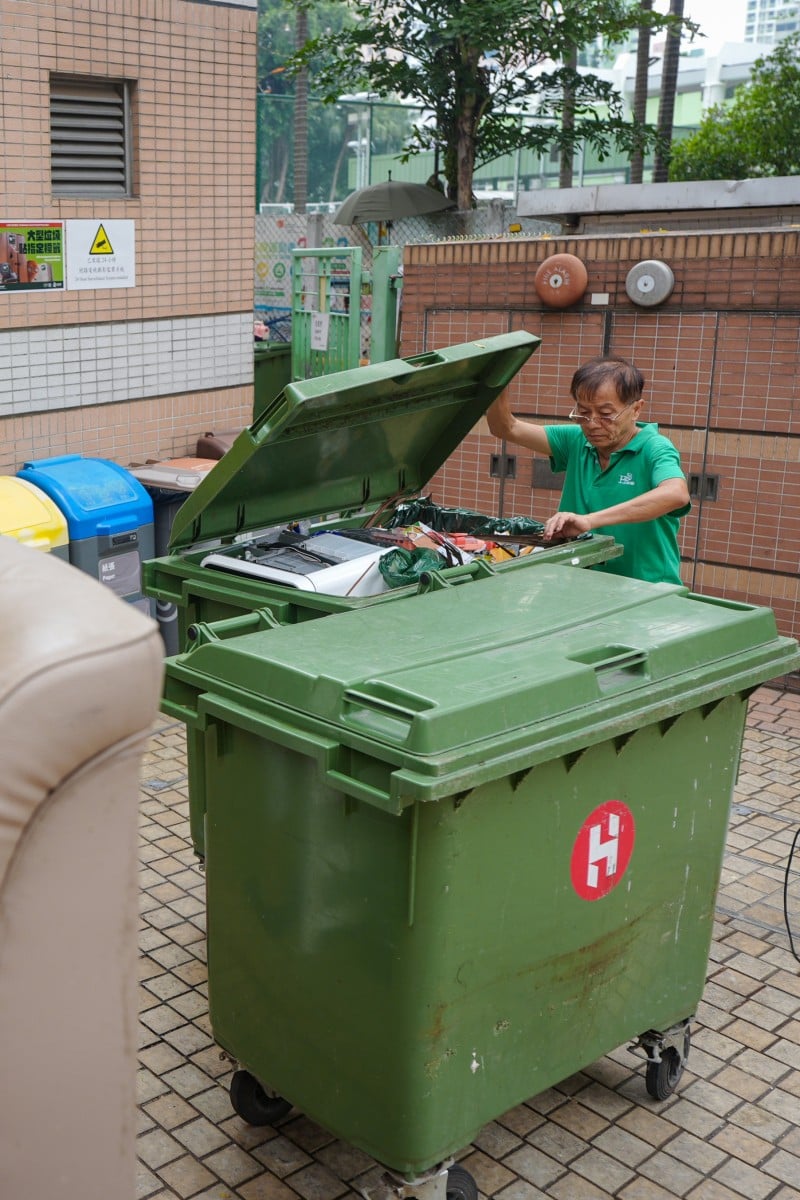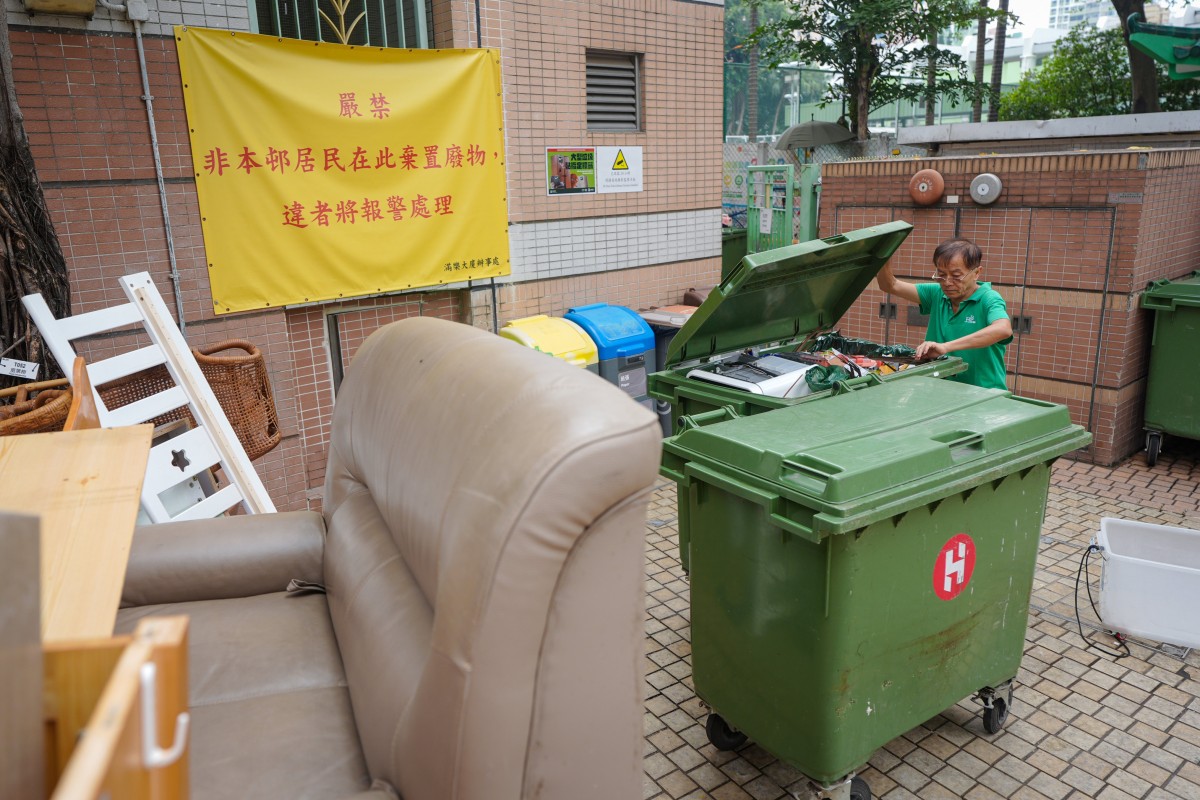
‘I don’t know what to do’: Hong Kong cleaners confused, overwhelmed by duty to monitor waste-charging scheme
- Frontline workers in residential buildings expected to monitor rubbish, but it is unclear if they will be penalised for trash that is not in government-approved bags
- Amid issues during trial run, officials have been hinting that the ‘pay-as-you-throw’ initiative’s will be postponed again
 A cleaner surnamed Chung works in Moon Lok Dai Ha, a public housing estate in Tsuen Wan that is included in a trial run of Hong Kong’s waste-charging scheme. Photo: Eugene Lee
A cleaner surnamed Chung works in Moon Lok Dai Ha, a public housing estate in Tsuen Wan that is included in a trial run of Hong Kong’s waste-charging scheme. Photo: Eugene LeeOne month into a trial run of Hong Kong’s waste-charging scheme, a cleaner surnamed Chung, 71 – who works at one of the two public housing estates involved in the pilot – expressed confusion about his role.
Chung, who works at Moon Lok Dai Ha in Tsuen Wan, is among the city’s frontline cleaners overwhelmed by an increased workload due to the scheme, as well as the responsibility to monitor residents’ rubbish.
“I don’t know what to do when people don’t use the bags. How are we going to speak to those who don’t comply with the regulation?” he said, expressing concern about conflict with residents who do not follow the policy.
“It’s not within our authority to enforce the rules.”
While Chung is supportive of the initiative to reduce waste, he highlighted that “very few” residents in his estate were using the designated bags: “People usually won’t use it if it costs money ... It’s a matter of mindset.”
Hong Kong launches trial run of waste charging scheme
Context on the scheme and its trial run
Amid public confusion, the launch of the municipal solid waste-charging scheme was delayed from April 1 to August 1. Last week, officials began hinting that the “pay-as-you-throw” initiative would be deferred again.
A pilot scheme began on April 1 at 14 locations – including two public housing estates and three private residential buildings – to help authorities prepare for the full roll-out. In residential buildings, each household was given 30 of the government’s 15-litre rubbish bags.
The pilot will run until the end of May, and government officials will review the trial’s results on May 27.
According to Edward Lau Kwok-fan, chairman of the legislature’s environmental affairs panel, there is “little chance” that the scheme will be implemented in August.
“I suggested that the government postpone the implementation and then rethink the strategy, including doing it in phases,” he told Young Post.
Lau added that officials should expand the premises covered in the trial and extend the adjustment period, while continuing to educate the public and adding more recycling facilities.
The government has not made it clear whether cleaners will be penalised if rubbish from their buildings is not in the designated bags, but they are expected to monitor the situation and handle all the unlicensed bags they collect.
But Lau stressed that cleaners should be “assisting” the city’s new scheme instead of “monitoring” and that they should be exempted from punishment.
“Frontline workers ... already had to do extra work for this policy. If they still need to bear legal responsibilities, I think no one would be willing to be a cleaner,” he said.
How customers, eateries are reacting to Hong Kong single-use plastics ban
First proposed in 2005, the scheme aims to encourage people to reduce waste and increase recycling. Residents must discard their trash in government-approved bags that come in nine sizes at a cost of HK$0.3 to HK$11. HK$11 labels will also be available for large garbage and furniture.
Only between 20 and 50 per cent of the households in the trial run were using the designated bags, environment minister Tse Chin-wan told a television programme.
At Lin Tsui House in Chai Wan – the other public housing estate involved in the trial – residents had mixed feelings about the waste tax.
Secondary school student Elsie Chan, 14, said she and her parents had easily adapted to using the government’s 15-litre bags daily over the past month, attributing this transition to their committed recycling efforts.
But Elsie supported extending the trial to drive behavioural change: “It would help educate people on its importance and encourage them to adapt to recycling,” said the CNEC Lau Wing Sang Secondary School pupil.
Others at Lin Tsui House said they rarely used the bags, including Jenny Yeung, 53, who found them “unnecessary”.
She said: “I prefer using the plastic bags I’ve collected from shops. Reusing these bags seems better.”
Another resident, Joyce Ho, 59, said the 15-litre bag was too small for daily use, and she described the scheme as “time-consuming” and “inconvenient”. She added that she would prefer to have more time to adjust.
Cleaners left clueless
Eastern district councillor Lam Wing-shing highlighted that cleaners working for Lin Tsui House now have to spend “an extra three hours a day” to handle the garbage in the building, which is home to about 300 households.
He explained that under the current trial scheme, cleaners were tasked with gathering the designated bags at a specified location for pickup by trucks. Non-designated bags, however, require a different truck for collection, doubling cleaners’ workload.
Lam recommended management companies increase manpower, provide training to frontline cleaners, and establish a standard operating procedure.
Why cleaners are teaching students about responsible waste disposal
“Education is of utmost importance. When everyone uses designated bags properly, the workload of frontline cleaners can be greatly reduced,” he said.
“If the citywide scheme can be postponed or implemented in phases, it will give the public and frontline cleaners more time to adapt, and they will have better acceptance and understanding of the scheme.”
“After all, if the [plan] is carried out hastily, the public or frontline cleaners may not understand the requirements sufficiently. This will certainly cause inconvenience.”
In anticipation of the scheme’s launch, people across the city have also been tossing out more oversized waste and discarded furniture for cleaners to handle.
At a public housing estate in Wong Tai Sin, a cleaner surnamed Hing, 65, said her workload doubled over the Lunar New Year holiday as many people discarded large items and left litter in the lobby for cleaners to pick up.
Hing noted that she had not received information about the scheme and had little confidence in its effectiveness because residents tended to litter and ignore instructions.
“Many residents don’t behave well. Every day, I find litter on the floors of the building, and it’s challenging to get them to listen,” said the cleaner whose monthly salary is about HK$9,000.
She hoped to receive training to prepare for the waste-charging scheme, as well as a fair pay rise for cleaners like herself, considering their increased responsibilities.
Designated 指定的
appointed or specified for a particular purpose or role
Municipal 市政的
relating to a city or a local government
Unlicensed 未經許可的
lacking official permission, authorization, or a valid license
Deferred 延期
postponed or delayed to a later time or date
Exempted 豁免
freed or released from an obligation, requirement, or liability; not subject to a particular rule or regulation
